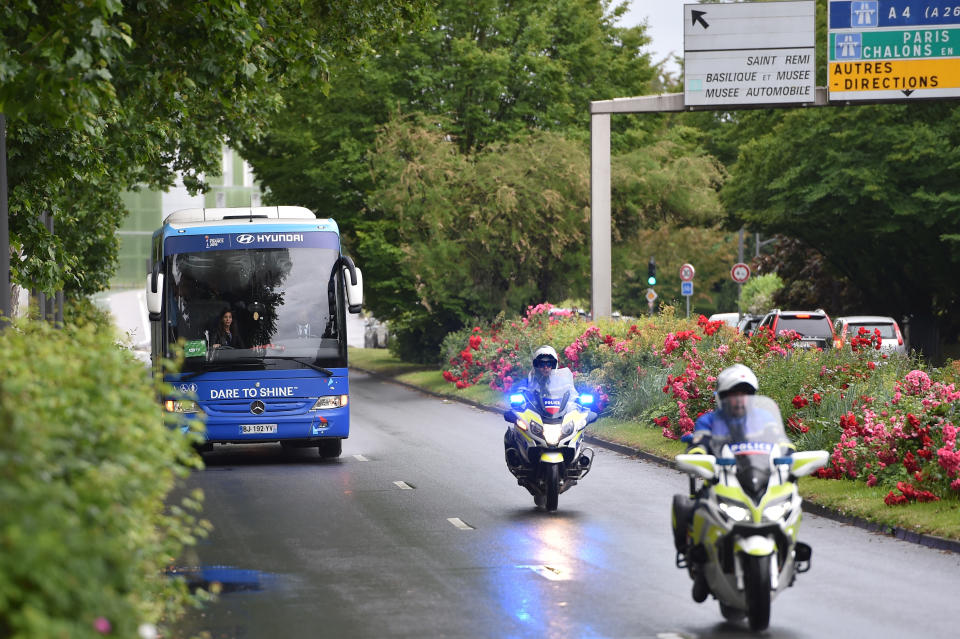In light of past ugly incidents, is FIFA doing enough to protect teams at the Women's World Cup?

PARIS — Crawling though the traffic-clogged streets of France’s iconic capital for a routine media availability with members of the U.S. women’s national team, what was supposed to be a short ride was beginning to drag on.
It was obvious when we finally reached our destination, however. Because parked right there, in broad daylight in front of the team hotel where the players and support staff would stay the next five days before Sunday’s second group match against Chile, sat the U.S team bus. It was covered in Women’s World Cup logos, a FIFA sponsor’s word mark and, not insignificantly, prominently emblazoned with an American flag.
There’s plenty of reasons to dunk on FIFA, the embattled governing body of the planet’s most popular sport that never seems able to get out of its own way. But one might think even they would recognize that publicly advertising which vehicles are transporting the 24 teams competing at France 2019 around the country — let alone leaving them in plain sight so everyone knows where the athletes are sleeping — might not be the brightest idea.
Unfortunately, this practice isn’t new. FIFA has been using team-branded buses to move players between hotels, stadiums, airports and training sessions since at least the 2006 men’s World Cup in Germany. They are not alone. In recent years, many of Europe’s leading club teams have also used their buses as rolling billboards to advertise their brands. That doesn’t change the fact that it’s a highly irresponsible thing to do, and it makes one shudder to wonder what it might take to change it.
It’s already insane that FIFA doesn’t have World Cup teams travel in unmarked busses for security reasons, let alone allowing one (and particularly this one) to sit parked in front of the team’s hotel. #USWNT pic.twitter.com/9uDFEgdCXM
— Doug McIntyre (@ByDougMcIntyre) June 13, 2019
Just over two years ago, German titan Borussia Dortmund’s bus — a black and yellow number with a giant BVB badge plastered on the side — was rocked by explosions en route to a Champions League game. Only the perpetrator’s ineptitude prevented fatalities in that instance.
The Togo team competing at the 2010 African Cup of Nations in Angola wasn’t as lucky. An assistant coach and two other people were killed and seven — including two players — were wounded when gunmen from an Angolan separatist group opened fire on the Sparrowhawks’ convoy. The fact that Togo’s bus didn’t feature identifying decals prevented more lives from being lost; another bus carrying its luggage took most of the bullets.
“They thought we were in the bus in front, fortunately for us,” midfielder Richmond Forson said afterward. “That's what saved us.”
Look, it’s safe to assume that security for the U.S. team in France is top-notch. It’s safe to assume that the State Department apparatus that accompanies the team internationally has left no stone unturned. The Americans ride with a police escort, and the vehicles that carry them will surely be screened before each time the players get on them.
France is one of the most thorough nations in the world when it comes to dealing with the threat of terrorism. It has to be. Who can forget the devastating attack that occurred in this jewel of a city in November of 2015—one that included a foiled attempt to detonate a bomb inside the Stade de France during a friendly between Les Bleus and Germany? What about the massacre at the offices of satirical magazine Charlie Hebdo just a few months earlier?
As a policy, the U.S. Soccer Federation doesn’t publicly reveal about how it keeps its delegation safe. Still, you can bet that the USSF’s security personnel were concerned about that bus just sitting in front of the hotel. There’s a good reason for that, too.
Many fans might not know this, but there’s a sinister history in France for U.S. Soccer. One of the country’s national teams has been a targeted at a World Cup before. In advance of the men’s event in 1998, European intelligence services uncovered a plot to ambush the USMNT while they were eating in the meal room at their Paris hotel.
Given all these different incidents, FIFA ought to be doing everything possible to help World Cup participants keep a low profile when traveling in public.
At Thursday’s aforementioned interview session, U.S. midfielder Rose Lavelle was asked if she wears her U.S. Soccer-issued hoodie when she leaves the premises to go get some fresh air or grab a coffee.
“Oh, heck no,” she said. “I’m not wearing this.”
Lavelle is a 24-year-old World Cup rookie, yet she understands that drawing unnecessary attention to yourself, especially in a place where everybody might not love you or the country you represent, isn’t smart.
Common sense is an instinct FIFA rarely seems to possess. But this is a far more egregious dereliction of its duty than, say, its inability to ensure that young children will be seated next to their parents at World Cup matches this summer. Here’s hoping they wise up quick and nix the flag-draped buses at future events before a preventable tragedy — heaven forbid — forces them to answer why they didn’t see such obvious danger a mile away.
More from Yahoo Sports:


